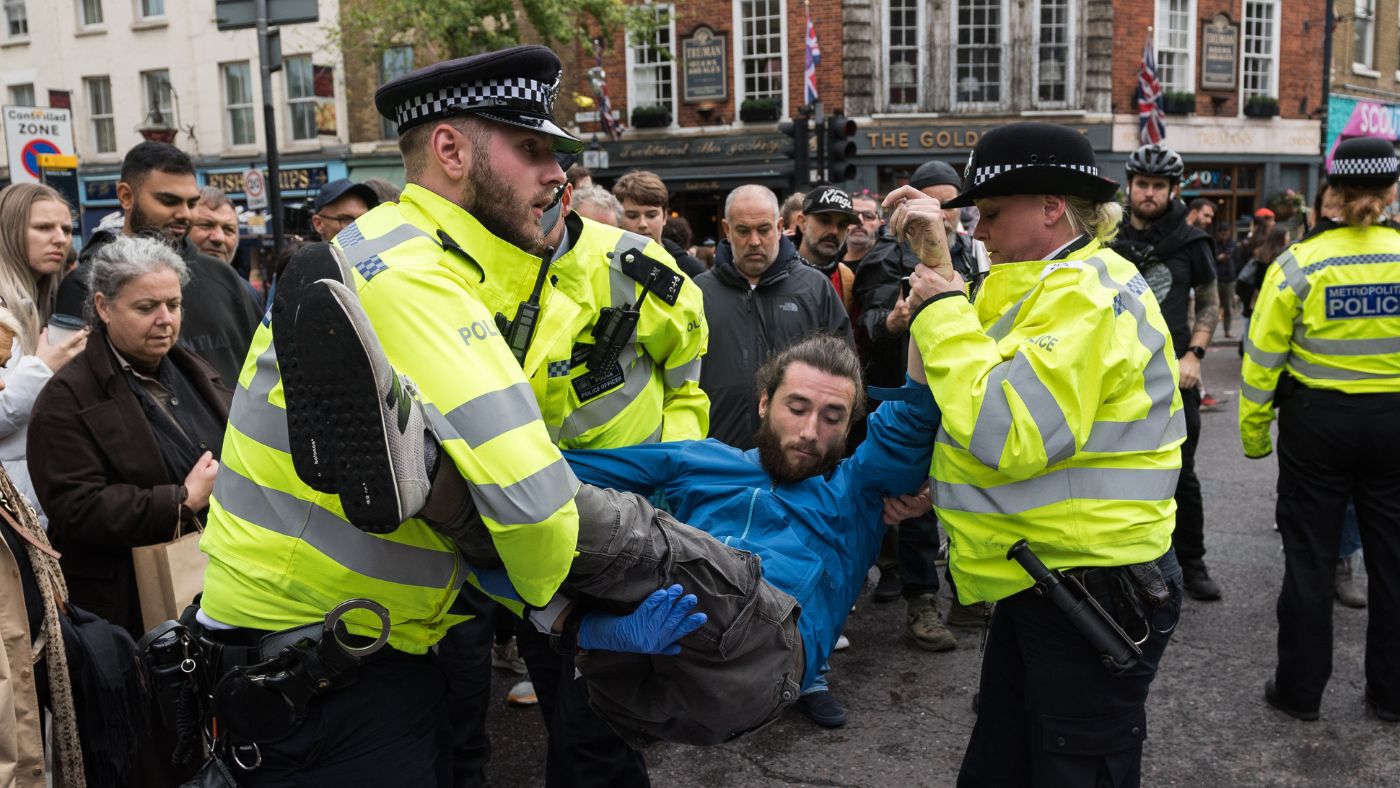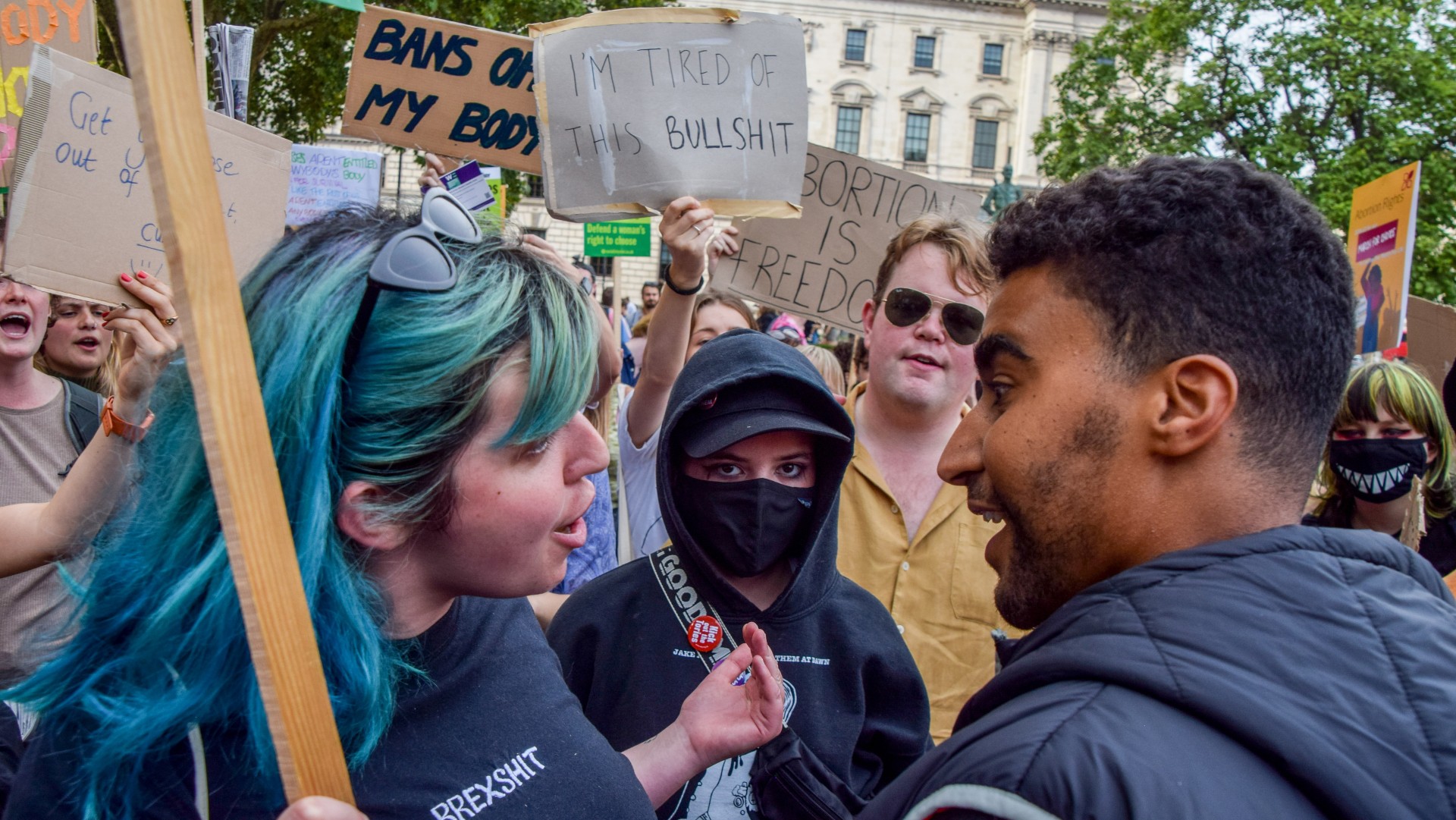Public Order Act: are harsher sentences for protesters necessary?
New laws to tackle disruptive demonstrations come into force today, just a few days before the coronation of King Charles III

A free daily email with the biggest news stories of the day – and the best features from TheWeek.com
You are now subscribed
Your newsletter sign-up was successful
Parts of a controversial public order bill that grants more authority to police to take action against non-violent protesters will come into force today, just days before the coronation of King Charles III.
The Public Order Act 2023 will “give police the powers to prevent disruption at major sporting and cultural events taking place this summer in England and Wales”, the Home Office said in a statement. Several measures come into force today, including new sentences of up to six months or an “unlimited fine”, for protesters who practise tactics such as “locking on”, in which they physically attach themselves to buildings or fences.
The bill, which came about following a rash of disruptive protests in recent years, has led to broad public debate about how demonstrations should best be handled by police and whether sentences are still too lenient.
The Week
Escape your echo chamber. Get the facts behind the news, plus analysis from multiple perspectives.

Sign up for The Week's Free Newsletters
From our morning news briefing to a weekly Good News Newsletter, get the best of The Week delivered directly to your inbox.
From our morning news briefing to a weekly Good News Newsletter, get the best of The Week delivered directly to your inbox.
Prime Minister Rishi Sunak said that the bill will help to “put people who try to carry out these guerrilla tactics behind bars” adding that he was “determined not to let selfish protesters get away with causing disorder and misery – so today, we end the chaos”.
‘A grave threat’
The bill arrives just before King Charles III’s coronation, at which anti-monarchists have vowed to protest.
Ahead of the weekend’s pageantry, the Home Office’s Police Powers Unit sent warning letters to several activist organisations, including anti-monarchist campaign group Republic, The Guardian reported. The letters explained that new powers had been brought forward to prevent “disruption at major sporting and cultural events”.
Lawyers have advised Republic that the warning could be viewed as “intimidatory”, days before their planned demonstrations in central London. Other groups, including Extinction Rebellion, said they have been sent similar letters, the newspaper said.
A free daily email with the biggest news stories of the day – and the best features from TheWeek.com
The new bill “openly targets groups such as Black Lives Matter, Extinction Rebellion and Just Stop Oil, all of which have used disruptive tactics in their protests against the government”, CNN said.
According to Quinn McKew, the director of the Article 19 campaign group, the measures introduced by the bill represent “a grave threat to the right to protest in England and Wales”.
In an opinion article for the i news site, McKew said that the legislation also “risks setting the UK’s human rights record back by decades – further jeopardising our already fragile reputation as the international champion of freedom and democracy”.
‘Daily lives ruined’
Punitive sentences have been handed out this year to activists from Just Stop Oil and Insulate Britain who have engaged in disruptive protests.
In a statement yesterday, Home Secretary Suella Braverman said: “The public shouldn’t have their daily lives ruined by so called ‘eco-warriors’ causing disruption and wasting millions of pounds of taxpayer money.
“The selfish minority must not be allowed to get away with this. We are giving our police and courts the tools they need to stop this chaos and I back them in making full use of these powers.”
Last month, five Insulate Britain protesters were jailed for five weeks for causing a public nuisance by blocking major roads during their campaign of civil resistance in 2021. In a separate case, two protesters from climate group Just Stop Oil, who scaled London’s Queen Elizabeth II Bridge, were sentenced to five years in prison.
Handing down the sentence to Just Stop Oil’s Morgan Trowland, 40, and Marcus Decker, 34, Judge Collery KC commented that the strict punishment was designed to deter copycat actions.
“You have to be punished for the chaos you caused and to deter others from copying you,” he told the activists.
Despite the judgements, a recent poll by The Sun newspaper found that 46% respondents wanted tougher sentencing for protesters.
The poll also found that 44% of people surveyed think that police are too lenient towards protesters, while just 13% said they are too harsh.
Arion McNicoll is a freelance writer at The Week Digital and was previously the UK website’s editor. He has also held senior editorial roles at CNN, The Times and The Sunday Times. Along with his writing work, he co-hosts “Today in History with The Retrospectors”, Rethink Audio’s flagship daily podcast, and is a regular panellist (and occasional stand-in host) on “The Week Unwrapped”. He is also a judge for The Publisher Podcast Awards.
-
 How the FCC’s ‘equal time’ rule works
How the FCC’s ‘equal time’ rule worksIn the Spotlight The law is at the heart of the Colbert-CBS conflict
-
 What is the endgame in the DHS shutdown?
What is the endgame in the DHS shutdown?Today’s Big Question Democrats want to rein in ICE’s immigration crackdown
-
 ‘Poor time management isn’t just an inconvenience’
‘Poor time management isn’t just an inconvenience’Instant Opinion Opinion, comment and editorials of the day
-
 Captain Tom: a tarnished legacy
Captain Tom: a tarnished legacyTalking Point Misuse of foundation funds threatens to make the Moore family a disgrace
-
 Assisted dying: will the law change?
Assisted dying: will the law change?Talking Point Historic legislation likely to pass but critics warn it must include safeguards against abuse
-
 Smoking ban: the return of the nanny state?
Smoking ban: the return of the nanny state?Talking Point Starmer's plan to revive Sunak-era war on tobacco has struck an unsettling chord even with some non-smokers
-
 When does adulthood begin?
When does adulthood begin?Talking Point From 16-year-old voters to lifetime bans on smoking, young people are living through a transition in views on political, social and emotional maturity
-
 Abortion law reform: a question of safety?
Abortion law reform: a question of safety?Talking Point Jailing of woman who took abortion pills after legal limit leads to calls to scrap ‘archaic’ 1861 legislation
-
 Andy Warhol, Prince and a question of copyright
Andy Warhol, Prince and a question of copyrightTalking Point Supreme Court ruling that sent shockwaves through art world could have huge implications for AI image generation
-
 Disaster trolls and conspiracy theories: is legislation the answer?
Disaster trolls and conspiracy theories: is legislation the answer?Talking Point Two Manchester Arena bombing victims are taking landmark legal action against conspiracy theorist Richard D. Hall
-
 Menopause: a matter for the law?
Menopause: a matter for the law?Talking Point The Government has decided against making menopause a ‘protected characteristic’ under the Equality Act